An unseasonably cool afternoon and the promise of a mural unveiling recently drew several dozen locals to the Near Southside. At 113 S. Main St., the striking image captures the tenor of the Van Cliburn International Piano Competition. A bird’s-eye view of a grand piano features keys, strings, and hammers bathed in vibrant warm and cool colors. On the left, a stark black background reads, “60 Years.”

Photo by Edward Brown
It was 64 years ago when the man after whom the competition is named, Fort Worth pianist Van Cliburn, won the inaugural Tchaikovsky competition in Russia, and it was 60 years ago when volunteers started the quadrennial Cliburn competition in Fort Worth. The 16th iteration begins Thursday.
“The candidates are coming from all over the world,” Cliburn CEO Jacques Marquis told the audience. “The best pianists in the world will come here to compete for a life-changing career.”
The commissioned artist, DASS, told the audience that he drew inspiration from a medical condition called chromesthesia that causes certain people to see color when they hear music.
After the opening remarks, past Cliburn competition finalist Fei-Fei Dong performed an entrancing trio of works by Chopin, Debussy, and Rachmaninoff.
The Cliburn competition returns after a one-year delay due to COVID-19. A record 388 pianists from 51 countries applied, and 30 competitors were selected. As with past competitions, the final concerto round will take place at Bass Performance Hall in mid-June.
Piano competitions are known for their dramatic flair, but no music competition in recent memory has pitted contestants from countries that are at war with each other. Soon after Russia invaded Ukraine in February, classical music venues and groups began banning Russian performers. In March, the Metropolitan Opera banned famed Russian soprano Anna Netrebko for two years. The Dublin International Piano Competition and Canada-based Honens International Piano Competition withdrew invitations to Russian pianists that same month. Organizers from both competitions subsequently reversed that decision following public outcry that the bans unfairly targeted musicians who have no direct ties to Russia’s war of aggression.
Marquis said the decision to allow Russians to compete was difficult but one that Cliburn leadership made based on the organization’s history of openness and Van Cliburn’s personal affinity for the people of Russia.
“When the Met said they would ban Netrebko, we were right before our screening auditions,” Marquis told me. “We had to address this situation quickly. We had 15 Russians coming to do the auditions. We had two executive meetings and a unanimous vote to accept Russians. The Russian pianists had nothing to do with [Russian President Vladimir] Putin’s decisions.”
The Cliburn, Marquis continued, has had a longstanding relationship with Van Cliburn and the Russian people.
“Van never talked about politics,” Marquis said. “He talked about people. He brought worlds together. That was so clear to us. The World Federation of Music Competitions came out and said we don’t discriminate based on race, ethnicity, gender, religion, and where you were born. Music transcends all of these boundaries.”
The announcement did receive some criticism. Kristian Lin’s Weekly article on the Cliburn’s decision to admit Russians drew comments from both sides of the debate.
“Russia is a country that use its army, diplomacy, industry, church, and all state resources, including unfortunately also culture, to collect former Soviet Republics, including Ukraine,” one reader commented. “If you fail with right decision, make sure the prize goes to Ukrainian widows and orphans.”
Cliburn communications director Maggie Estes said that most feedback from the community, competitors, and donors has been supportive. Marquis said that seeing Fort Worthians warmly welcome Russians during the preliminaries has been an emotional experience for locals and the competitors.
My interviews with competitors from Russia and Ukraine were done with the safety of the pianists and their families in mind. I was told I could interview only Russians who were living outside of their homeland about the war.
“My life has significantly changed since February 24th,” said Anna Geniushene, a Moscow native who now lives in Lithuania. “Not only because I had to make a decision to leave my home country but mainly because I have been experiencing something I would name a non-healing wound in my heart. What is happening continues to shatter me into pieces. Actually, I was thinking to make a withdrawal as I really felt I could not be in a decent state of mind during the process of preparation. After a while, I realized I need to travel and tell my story.”
Ukrainian Dmytro Choni said that music has the power to unite and heal, even during the hardest of times.
“Music is the universal language which everyone in the world understands,” he said. “Music has powerful energy which unites people, fills hearts with love, and gives hope.”
*****
“The crowds grew daily in front of the Moscow Conservatory of Music: workmen in fur hats; matriarchs draped in black coats and scarves; teenage girls clutching bundles of lowers and shivering in the crisp air,” Stuart Isacoff wrote in the opening chapter of When the World Stopped to Listen: Van Cliburn’s Cold War Triumph and Its Aftermath.
The year was 1958, and the Muscovites were gathered to catch a glimpse of the 23-year-old Texan who was winning the hearts of Russians with each solo piano performance during the first-ever Tchaikovsky Competition. Tensions between the Soviet Union and the United States, especially after the Soviets launched the world’s first satellite, Sputnik, were at an all-time high, placing the world under daily threat of an all-out nuclear war between the two superpowers.
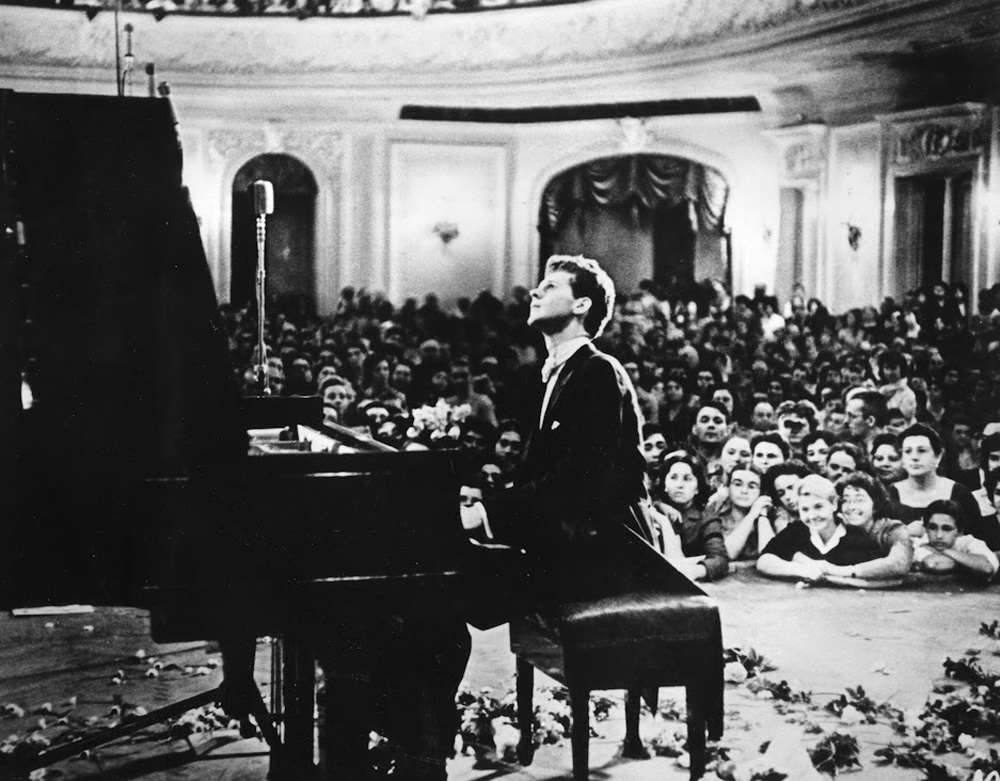
Courtesy of the Cliburn
Van’s youthful and lanky visage, along with his frock of curly hair and Southern drawl, disarmed the Muscovites. Van was the singular topic of discussion during the early days of the competition. The childhood native of Kilgore, Texas, began his pianistic studies under his mother, Rildia Bee O’Bryan Cliburn.
Cliburn would go on to study with Ukrainian pianist Rosina Lhévinne, herself a graduate of the Moscow Conservatory, in 1951. When considering the newly announced Tchaikovsky Competition, Cliburn expressed hesitancy about competing in a foreign environment.
Lhévinne responded, “You will have to work with great intensity, and this will be good for you regardless of the contest. You will have to learn a great deal of new material. You will meet the elite of the young pianists from around the world. Last but not least, I believe you will win.”
The decision to award Cliburn the gold medal came directly from Nikita Khrushchev. The Soviet leader was consulted about the near draw between Russian Lev Vlassenko and Cliburn. Khruschev, based on the official story released to the press, answered simply.
“Was [Cliburn] the best?” he said. “Then give him the prize.”
Current Cliburn competitor Clayton Stephenson told me in a phone interview that Cliburn represents a universally admired artist who transcended the world of classical music.
“A lot of people who don’t know about classical music know about Van Cliburn,” Stephenson said. “That inspires me to become someone like Van Cliburn. It informs how a classical musician could be.”
Growing up in a single-parent household in New York City, Stephenson said piano lessons were both an avenue out of financial hardships and something of a bargain.
“I was rowdy as a kid,” Stephenson recalled. “My mom was looking for a babysitter so she could have a few hours of free time. Babysitters charged $30 an hour, and my mom found that piano teachers charge $35 an hour. For an extra $5, she sent me to music school to learn something. My teacher taught me to love the music I was playing. It imparted for me the love for music that I have today.”
Without the availability of low-cost community programs like summer camps, Stephenson said he never would have found opportunities to advance in a field that often requires expensive private lessons.
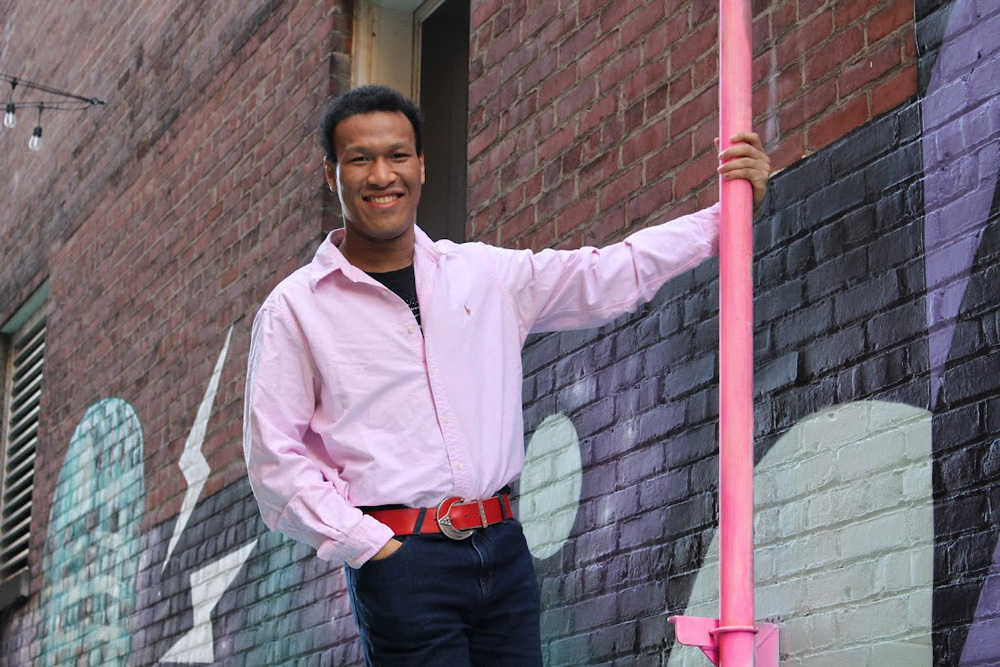
Courtesy of the Cliburn
“When I was 8, I auditioned for the Juilliard Outreach Music Advancement Program,” he continued. “Stepping inside Julliard was new to me. I got to see what it was like to go to an amazing conservatory. People in the pre-college division were not that much older than me, and they were performing full hour-long recitals. After my classes were done, I’d listen to these kids who were 12, 13, and 14 play. At that point, I decided that I wanted to get into the Julliard pre-college program. My teacher at the time, Beth Nam, dedicated so much time free of charge just to prepare me for it. The first year I didn’t get in. The second year I did. That was a big step up for me. Ms. Nam believed in me and worked tirelessly to coach me. Her dedication and my hard work paid off. I became the first student ever from the Juilliard Music Advancement Program to be directly admitted into the Juilliard pre-college program.”
Clayton is currently studying in a dual-degree program of a bachelor’s in economics at Harvard University and a master’s in piano performance at the New England Conservatory. Studying economics, reading literature and history, and understanding other artforms help make him the type of well-rounded musician who can appeal to a wide range of audiences, just like Cliburn did.
“Becoming an all-encompassing musician is about more than practicing,” Clayton said. “It is about understanding the history and culture of that time. Music, for me, is communicating different emotions and expressions. That is something we all as humans experience.”
Clayton said Fort Worth audiences can expect a wide range of repertoire from him.
“I really love jazzy classical pieces, stuff like Gershwin,” he said. “If I get to the final round, you’ll hear me play the Gershwin Concerto in F. I also love transcriptions. I like people who take something that is well known and reimagine it. One of my favorites is the Firebird transcription by Agosti. It is supposed to be this amazing orchestra piece. He is usually very conservative in the number of notes he puts on the page. For this transcription, it is all over the place. There are three or four staves. He is trying to incorporate all the pieces. Hopefully, I can translate that.”
The war in Ukraine, Clayton said, puts his privilege to be able to perform in perspective.
“I am doing what I love in America, not interrupted by war,” he said. “There are a lot of people whose lives have been displaced. I have been able to continue doing what I love. Because I have this opportunity, I have to honor these people who are not in the situation I’m in.”
Included in his repertoire is the seventh sonata by Sergei Prokofiev. Written at the height of World War II, the song captures the violence, banality, and incomprehensible nature of war.
“He was born in modern Ukraine,” Clayton said. “That’s my homage to what is happening.”
Van Cliburn’s connection with the Russian people is still felt by Russians, Geniushene said.
“Certainly, Van Cliburn winning the first Tchaikovsky competition is a milestone, not only for his world career but also for the competition itself,” she said. “I heard a lot of stories from my former teachers who knew Van’s excellent piano performances. He became a gold example for a lot of Russian pianists. People adored him. We still have a lot of books about that period of time. I was so lucky to meet him when he came for one of the Tchaikovsky competitions. I believe that was his last visit to Russia. That was something special for me.”
Like Clayton, Geniushene said learning piano pieces is more than a technical endeavor.
“I always try to get into details about the epoch, the circumstances, history, and artistic events” that shaped a composition, she said.
The upcoming competition will be Geniushene’s first time performing in the United States. “I am so honored to have a chance to meet [an American] audience and to finally be judged by musicians whose names mean so much to me. Of course, this is always a game, and we don’t know how far it will go. But I keep my hopes it would be a moment to remember, certainly in a positive way.”
Music, she said, has always been a source of healing. Through scheduled performances of works by Brahms, Prokofiev, and other great composers, the Moscow native aims to share a message of unity and hope.
“Music is a wonderful healing instrument that unites people, cultures, and eras,” she said. “It always gives you strength and a spare hand when you are down. It gets you active and energized when you are about to give up. It comforts your soul when you are distressed. And, of course, it is a real community where everyone is welcome no matter how experienced one is. Every time I am onstage, my music will speak about humanity, unity, and praying for the soonest end of the war conflict.”
Ukrainian Choni said he has followed past competitions closely and is excited for the opportunity to compete in this year’s contest. The Kyiv native began studying piano at 4, and, at 28, he has won prizes at nearly 20 international piano competitions. Audiences will hear selections from his favorite composers from the Romantic period and 20th century.
“At the moment, most of all I like to play Brahms, Debussy, and Prokofiev,” he said. “They are all on my competition program. I watched some documentaries about the past editions of the [Cliburn] competition, and I’m very happy to take part myself this year.”
*****
This year’s competition will likely reach record numbers of viewers, the Cliburn’s Estes said. In addition to the online streaming platform Medici, Cliburn staff will utilize live viewing options across a range of social media apps that include YouTube and China-based Amadeus. Estes estimates that viewership could easily reach several million or more. The competition will offer ultra-high levels of audio and video (4K) for subscribers as well as free streaming options at 1080p (standard for HD).
“We have grown our viewership exponentially,” Estes said. “We started webcasting in 2001. We were the first classical music competition to do that. We will be reaching 170 countries, which is basically what the internet captures.”
This year, the video interviews will have more of a professional sports feel, Maggie continued, with commentary from guest classical musicians and live pre- and post-performance interviews with the contestants. Gone this year is the chamber music round. Marquis said that the semifinal round will instead include a Mozart concerto performance.
“A Mozart concerto is very telling,” Marquis said. “It’s like chamber music. Chamber music wasn’t giving [the judges] more information. When we look at the careers of the winners, they have to play a lot of concertos.”
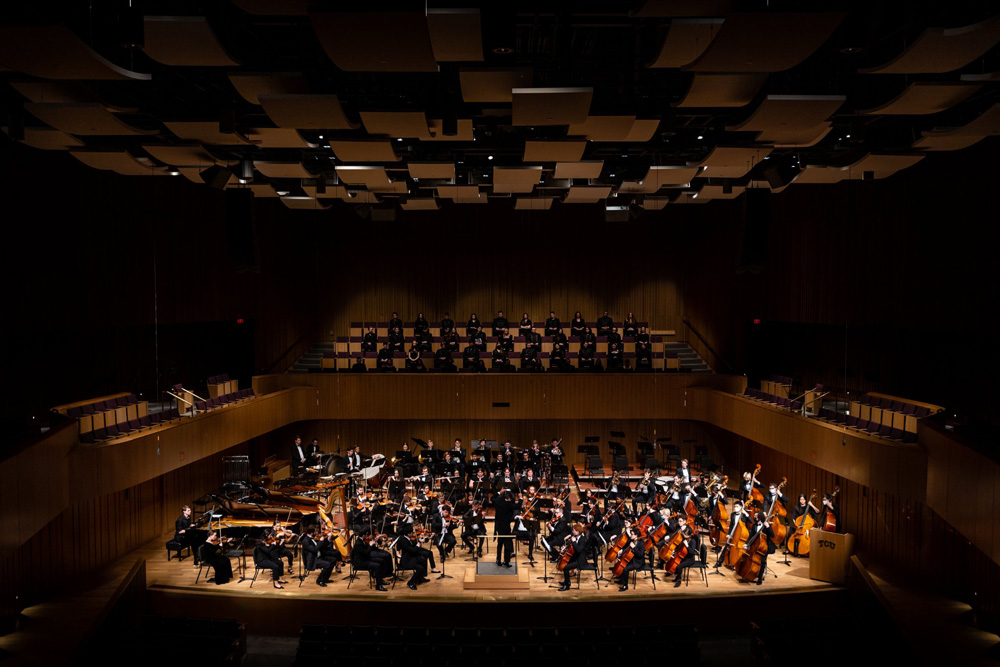
Courtesy of Facebook
The concerto round has also changed. Finalists will perform two concertos, each from a pre-selected list. While final rounds in past competitions have been dominated by Tchaikovsky, Prokofiev, and Rachmaninoff, the new list brings works that were infrequently heard in previous concerto rounds.
“Now, we have a list of all the others that include Beethoven, Schumann, Saint-Saëns, and Chopin,” Marquis said “We never heard those concertos. We go from Mozart to Liszt or Ravel and then Rach 3. It’s a lot of information. Since we are launching careers, they have to deliver every round. For the audience, it will be fantastic.”
Sandra Doan, director of artistic planning, said COVID has brought challenges and opportunities for competitors.
“I think that one of the reasons that we had so many applicants was because they have had more time to prepare,” she said. “They have had fewer opportunities to perform for large audiences. This will be different for them. Some of them probably had to do online lessons for a year. They had a lot of challenges.”
The return to performing before live audiences will likely mean a boost of excitement for the performers, she added.
“The audiences are also excited,” she said. “There will be a lot of energy.”
Gold, silver, and bronze medalists will respectively win $100,000, $50,000, and $25,000. The three winners also earn a three-year artist management contract under Doan and a busy touring schedule at the most prestigious performance halls and festivals across the world.
The Cliburn competition is designed to support the careers of every competitor, Marquis said. Besides additional prizes like Audience Favorite and the prestige that comes with being a finalist, the nonprofit schedules community concerts throughout the competition. Many non-medalists have made connections with visiting conductors and concert organizers over the years, he said.
Over the three years of management, Doan coaches the young artists on a range of topics, from managing finances to social media promotion.
“We provide these opportunities,” she said. “We want to help them take advantage of the opportunities. This is where personalized mentorship and management come in. What are they strong at that we can amplify or weak that we can strengthen? You are used to playing 10 concerts a year. Now you are on the road for 150 days. Then they have to figure out how to practice and keep their artistic curiosity going.”
Estes helps the artists market themselves to new followers through a personal website and social media platforms.
“We have an initial conversation,” Estes said. “ ‘Who are you as an artist?’ It can be a hard thing for an artist. Some are drawn more to social media than others. It is a direct route to connect with your audience. It is a tool that they can use that we encourage them to use.”
Competitor Stephenson said the competition will give the pianists something that COVID took away — the opportunity to perform for an audience.
“Music cannot be appreciated unless there is an audience there,” he said. “I’m trying to be someone who has fun. I’m having fun, so hopefully the audience has fun as well. I’m not trying to do the most technically difficult or fastest thing. I’m trying to make them hear a world if only for a minute, a beautiful world that we can all inhabit together.”
Marquis said this year’s competition will have significance for many reasons. At 60, the Cliburn has managed to follow its founding principles.
“We will be reconnecting with our founding values,” he said. “Sixty years ago, when you think of volunteers, they are still here. TCU was there, and they are still here. Fort Worth Symphony Orchestra was a part of our founding, and they are still here. The mandate for the Van Cliburn competition in 1962 was dual: to help young musicians and to share [their performances] with the largest audience possible. We are still there. We help young musicians, and we help to share this with the world. We are still very coherent 60 years later, which is great. It’s why we are so strong as an organization.”



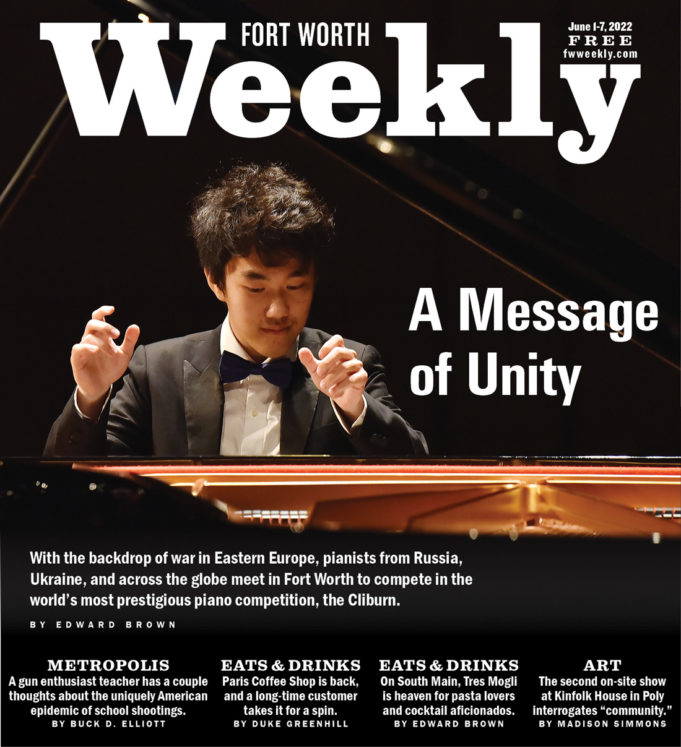

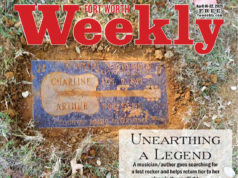







I appreciate the in-depth columns about the competition and competitors here at FWW